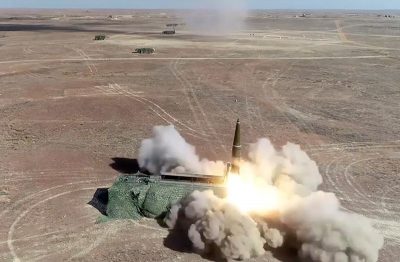The Psychotic Logic of the New US-Russia Arms Race: One Step Closer to Nuclear Confrontation

On October 7th, Russian ambassador to the United States Anatoly Antonov said that Russia and the US needed to come to grips with the issue of short-range and intermediate-range missile deployment.
“In case the United States deploy these types of missiles very close to our borders, we will be forced to protect our country, we will be forced to resort to the necessary measures….It is high time for us to sit at the negotiations table, to stop negotiating via media trading accusations; it is high time to meet, perhaps in Geneva, in Vienna, in Washington, in Moscow and to come to grips with these issues,” he said.
Ambassador Antonov also said that he had requested a meeting with new US National Security Adviser Robert O’Brien and with State department officials. This follows a statement by British ambassador to Russia Laurie Bristow on October 4th, wherein he said that the UK government had received President Putin’s proposal concerning a moratorium on short-range and intermediate-range nuclear missiles, but that the UK-government did not consider it a realistic offer in view of Russia’s test-firing of the 9M729 cruise-missile from the Kapustin Yar launch-site in Astrakhan.
They’re still talking about Kapustin Yar. No mention whatsoever of the American cruise missile test on August 18th, or of the Pentagon’s announcement of plans to test-fire a missile similar to the Pershing II, which was prohibited under the now-defunct INF Treaty, or of the deployment of MK-41 missile launch-pads (which are capable of firing Tomahawk cruise missiles) in Japan, Poland and Romania.
Without having produced any publicly verifiable evidence whatsoever that the Kapustin Yar test did in fact violate the terms of the INF Treaty, the NATO alliance nonetheless still cites the Kapustin Yar test of the 9M729 cruise-missile as justification for pressing ahead with an extremely aggressive intermediate-range missile-policy. This completely unverified allegation regarding a marginal INF Treaty violation by Russia in the conduct of the cruise-missile test at Kapustin Yar remains their fig-leaf.
Of course, on the purely strategic level, Ambassador Antonov understands the situation as clearly as anyone, but well-trained diplomats don’t think out loud. He understands perfectly well that, in the case of this issue, it would be extremely dangerous to do so. Once we say the unsayable, it moves us one little cognitive step closer to doing the unthinkable. So Ambassador Antonov prudently decides to appeal to our pragmatic common sense, rather than analyzing the arms-race as the amoral chess-match which it is.
In coldly amoral terms, the strategic situation may be summarized as follows:
The United States has no particular reason to come to any agreement with Russia concerning short-range or intermediate-range missiles. The existence of US military bases in Poland, Romania, Japan etc, means that the United States’ strategic nuclear advantage exists on the level of short-range and intermediate-range weapons. The same cannot be said regarding intercontinental ballistic missiles. Therefore, when US officials argue that they would prefer “a more comprehensive agreement,” they are being disingenuous, ignoring the elephant in the room. Everybody in Russia’s political and foreign policy establishment, including Ambassador Antonov, understands this clearly.
However, once the coldly amoral, psychotic logic of that chess-match is publicly conceded or alluded to by people in positions of leadership, we are one little cognitive step closer to nuclear confrontation. Therefore Ambassador Antonov’s appeals to common sense, which may at first glance appear naïve, are grounded not only in a diplomat calculation but also in a moral calculation.
To understand the strategic nuclear situation in clear, coldly amoral terms, we must also bear in mind the economic fundamentals which drive it. The world is running out of natural resources very quickly, and Russia is blessed with natural resources. This is the most central factor determining the levels of geo-strategic hostility which the western alliance shows toward Russia. Ultimately, the nations of the western alliance need Russia to become a minerals and hydrocarbons colony, to subsidize their unsustainable models of financialized capitalism. That model has always required subsidization by the natural resources of de facto colonies, and always will.
If we compare the predicament of the United States today to its geo-strategic logic 35 years ago, the Reagan administration were also imperialists, of course. However, the Reagan administration believed that they could afford to play a long-term geo-strategic game.
That long-term game is no longer possible – the western economies’ access to cheap natural resources is now dwindling too quickly.
This sense of economic desperation is ultimately what forces the western alliance to once again raise the nuclear stakes. Subtle forms of geo-strategic pressure are no longer seen as adequate. This is the central reason why it is extremely improbable that we will see a new agreement on short-range or medium-range missiles between Russia and the United States in the foreseeable future. In short, it was always inevitable that a systemic crisis in the western model of financialized capitalism would re-ignite the cold war, and therefore trigger new nuclear threats. Furthermore, that crisis within financial capitalism was in itself always inevitable, because capitalism ultimately cannot be purely “financial.”
*
Note to readers: please click the share buttons above or below. Forward this article to your email lists. Crosspost on your blog site, internet forums. etc.
Padraig McGrath is a political analyst.

